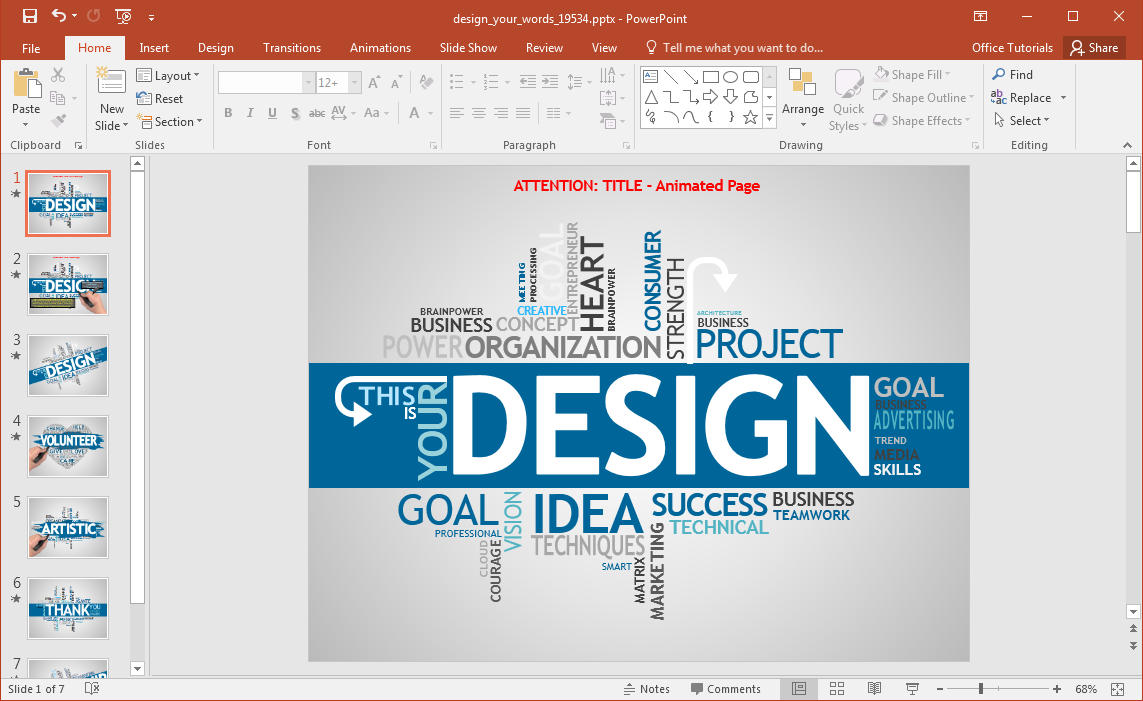

- Create word cloud in powerpoint generator#
- Create word cloud in powerpoint software#
- Create word cloud in powerpoint code#

# We also don’t want text such as style and script codes # "//text()" returns all text outside of HTML tags. Wordcloud(d$word,d$freq, min.freq=min.freq, max.words=max.words, If(!colorPalette %in% rownames()) colors = colorPaletteĮlse colors = brewer.pal(8, colorPalette) If(textStemming) docs <- tm_map(docs, stemDocument) TextStemming=FALSE, colorPalette="Dark2",Įlse if(type="url") text <- html_to_text(x)ĭocs <- tm_map(docs, content_transformer(tolower))ĭocs <- tm_map(docs, removeWords, stopwords(lang))ĭocs <- tm_map(docs, removeWords, excludeWords) Rquery.wordcloud <- function(x, type=c("text", "url", "file"), # value returned by the function : a list(tdm, freqTable) # max.words : Maximum number of words to be plotted. # min.freq : words with frequency below min.freq will not be plotted

# colorPalette : the name of color palette taken from RColorBrewer package, # textStemming : reduces words to their root form # excludeWords : a vector of words to exclude from the text # type : specify whether x is a plain text, a web page url or a file path # x : character string (plain text, web url, txt file path)
Create word cloud in powerpoint generator#
# rquery.wordcloud() : Word cloud generator The above image clearly shows that “Will”, “freedom”, “dream”, “day” and “together” are the five most frequent words in Martin Luther King “ I have a dream speech”. Res<-rquery.wordcloud(filePath, type ="file", lang = "english",
Create word cloud in powerpoint code#
Generate the word cloud using the R code below : source('') Copy and paste your text in a plain text file.“ I have a dream speech” (from Martin Luther King) is processed in the following example but you can use any text you want : Plain text file can be easily created using your favorite text editor (e.g : Word). least frequent terms droppedĬreate a word cloud from a plain text file min.freq : words with frequency below min.freq will not be plotted.a name of color palette taken from RColorBrewer package (e.g.: colorPalette = “Dark2”).A stemming process reduces the words “moving” and “movement” to the root word, “move”.

Create word cloud in powerpoint software#
The procedure to generate a word cloud using R software has been described in my previous post available here : Text mining and word cloud fundamentals in R : 5 simple steps you should know. Operations on the result of rquery.wordcloud() functionĪs you may know, a word cloud (or tag cloud) is a text mining method to find the most frequently used words in a text.Create a word cloud from a plain text file.R tag cloud generator function : rquery.wordcloud.


 0 kommentar(er)
0 kommentar(er)
